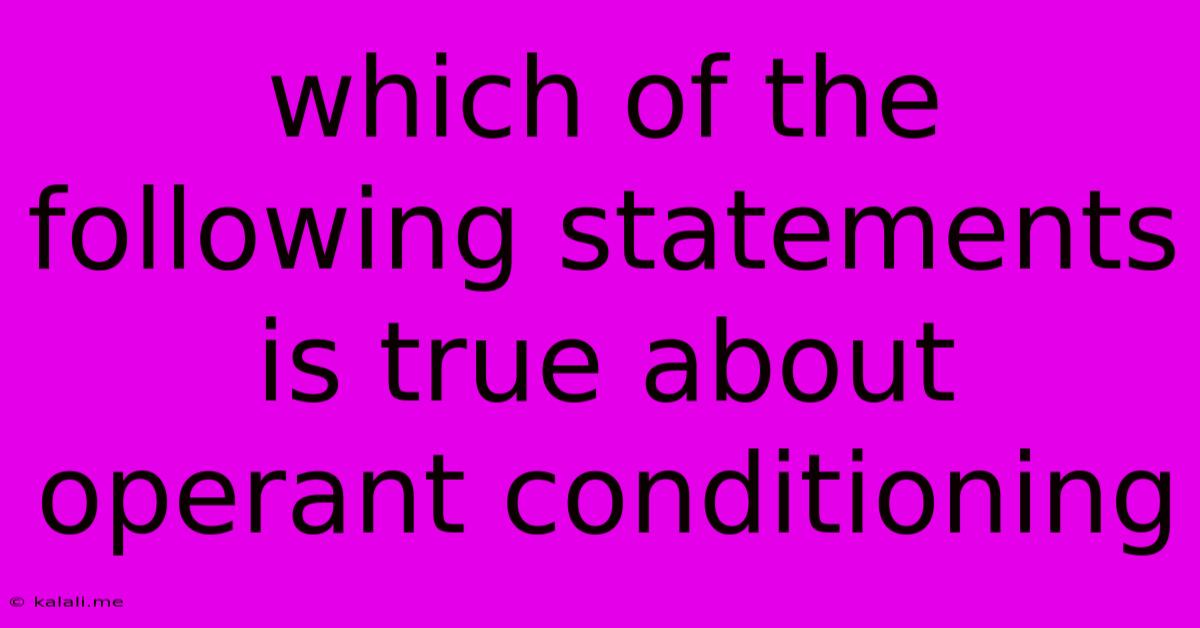Which Of The Following Statements Is True About Operant Conditioning
Kalali
Jun 13, 2025 · 3 min read

Table of Contents
Which of the Following Statements is True About Operant Conditioning? Deconstructing the Principles of Reinforcement and Punishment
Operant conditioning, a cornerstone of behavioral psychology, explains how we learn through consequences. Understanding its principles is crucial for effective learning, training, and even self-improvement. This article will delve into the core tenets of operant conditioning, clarifying common misconceptions and answering the question: which statement about operant conditioning is true? We'll explore various statements, analyzing their accuracy and providing clear explanations based on established psychological principles.
What is Operant Conditioning?
Before we tackle specific statements, let's establish a firm understanding of operant conditioning. Developed by B.F. Skinner, this learning process involves associating voluntary behaviors with their consequences. These consequences can either increase (reinforce) or decrease (punish) the likelihood of a behavior recurring. Key concepts include:
-
Reinforcement: A consequence that strengthens a behavior. Reinforcement can be positive (adding something desirable) or negative (removing something undesirable). Think of a dog receiving a treat (positive reinforcement) or a car seatbelt buzzer stopping when you buckle up (negative reinforcement). Both increase the likelihood of the desired behavior repeating.
-
Punishment: A consequence that weakens a behavior. Punishment can also be positive (adding something undesirable) or negative (removing something desirable). Receiving a speeding ticket (positive punishment) or having your phone taken away (negative punishment) are examples that decrease the likelihood of the undesired behavior repeating.
-
Extinction: The weakening and eventual disappearance of a learned behavior when reinforcement is withheld.
Evaluating Statements About Operant Conditioning:
Now, let's analyze some common statements about operant conditioning to determine their truthfulness. The correct statement will accurately reflect the principles outlined above. Remember that the effectiveness of operant conditioning depends heavily on the consistency and timing of reinforcement or punishment.
Here are some example statements, followed by their evaluation:
Statement 1: Operant conditioning only involves rewarding desirable behaviors.
Evaluation: False. While positive reinforcement is a crucial element, operant conditioning also incorporates punishment to decrease undesirable behaviors and negative reinforcement to strengthen behaviors by removing aversive stimuli. A comprehensive understanding requires recognizing the role of both reinforcement and punishment.
Statement 2: Positive reinforcement always leads to immediate behavior change.
Evaluation: False. While positive reinforcement is generally effective, the timing and consistency of reinforcement significantly impact its effectiveness. Delayed reinforcement is often less powerful than immediate reinforcement. Furthermore, the magnitude of the reinforcement matters; a small reward may not be as effective as a larger, more desirable one.
Statement 3: Negative reinforcement is the same as punishment.
Evaluation: False. Negative reinforcement strengthens a behavior by removing an unpleasant stimulus, whereas punishment weakens a behavior by introducing an unpleasant stimulus. They are distinct concepts with opposite effects on behavior.
Statement 4: Operant conditioning is applicable only to animals.
Evaluation: False. Operant conditioning principles apply to both animals and humans. Learning through consequences is a fundamental aspect of behavior across species. We learn through rewards and punishments in various aspects of our lives, from childhood to adulthood.
Statement 5: Consistent reinforcement is crucial for establishing and maintaining learned behaviors.
Evaluation: True. This statement accurately reflects a core principle of operant conditioning. Consistent reinforcement, whether positive or negative, is vital for establishing a strong association between behavior and consequence, leading to the consistent repetition of desired behaviors and the suppression of undesired ones.
Conclusion:
Understanding the nuances of operant conditioning is key to applying its principles effectively. The correct statement highlights the importance of consistent reinforcement in shaping behavior. By understanding the different types of reinforcement and punishment, and their impact on learning, we can harness the power of operant conditioning for personal growth, training, and effective behavior modification. Remember that effective application requires careful consideration of timing, consistency, and the appropriate type of reinforcement or punishment for the specific behavior.
Latest Posts
Latest Posts
-
Which Planet Is Not A Terrestrial Planet
Jun 14, 2025
-
If The Price Elasticity Of Demand Is 1 Then
Jun 14, 2025
-
Which Metal Is A Poor Conductor Of Heat
Jun 14, 2025
-
Find Each Measure M1 M2 M3
Jun 14, 2025
-
What Are The Prime Factors Of 43
Jun 14, 2025
Related Post
Thank you for visiting our website which covers about Which Of The Following Statements Is True About Operant Conditioning . We hope the information provided has been useful to you. Feel free to contact us if you have any questions or need further assistance. See you next time and don't miss to bookmark.